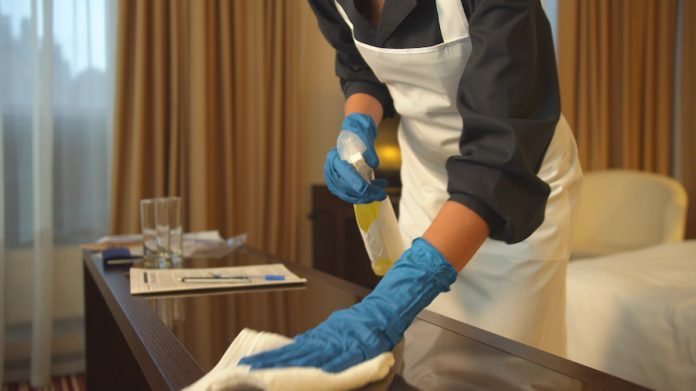
BOISE, IDAHO — Officials of the Cornerstone Collective recently announced a program to provide hotel brands, owners, and operators with a road map to design their properties safely, intelligently, and prudently for today and through recovery from the COVID-19 crisis. The proprietary Nexus Design Standards lay out specific criteria culled from expert sources, including the CDC, EPA, WELL, LEED, IBC, Fitwel, Mindful Materials, and medical specialists. The program provides non-biased, research-based solutions that provide guidance for safe design while helping optimize each hotel’s uniqueness.
“A number of brands and hotel management companies have put together their own pandemic safety procedures, but no two are alike,” said Suzie Hall, founder and president, The Cornerstone Collective. “If an owner has multiple brands or owns an independent property, there is no trusted resource to assist them through what can be a costly process. The Nexus Design Standards are the first unified, all-encompassing approach that addresses all aspects of design for the ‘new normal.’ There is a lot of confusion and conflicting claims ranging from what constitutes appropriate distancing to what makes the most effective barriers. Not only do Nexus Standards include potentially life-saving advice, but they can substantially reduce costs by 15-40 percent. The Standards are supplier-agnostic but provide clear specifications on materials which often cost less than other options, even though the quality is similar if not superior.”
Hall has spent the last 28 years designing and advocating for how indoor environments can improve human health and well-being, and has completed 20 LEED projects and dozens of healthcare assignments. “We’ve called upon our experience in designing hospital interiors, which present a higher concern for safety, as well as my current position on the Board of the St. Alphonsus Hospital Foundation. Utilizing that expertise, we worked with expert sources that form the core of the program.”
The new standards address key areas that include disinfectability, cleanability, performance, health, environmental, price, life cycle cost, sustainability, proof of product properties/claims, and warranties. The below are specifics from three of these areas:
Disinfectability
- FFE upholstery must be sanctioned as disinfectable by the EPA.
- Cleaning agents should be EPA-approved against COVID-19. Disinfection of surfaces and objects touched by multiple people is important.
- When EPA-approved disinfectants against COVID-19 are not available, alternative disinfectants can be used (for example, a third cup of 5.25 percent–8.25 percent bleach added to 1 gallon of water, or 70 percent alcohol solutions). Do not mix bleach or other cleaning and disinfection products together. This can cause fumes that may be extremely dangerous to inhale. Bleach solutions will be effective for disinfection up to 24 hours. Keep all disinfectants out of the reach of children.
Performance
- All FFE upholstery should have an integrated fabric barrier system (mitigates pathogens and bacteria getting through)
- Upholstery should be PVC, phthalate, and formaldehyde-free
- Minimum 50,000 double rub rating for upholstery
Proof of Product Properties
- All products should require HPD (Health Product Declaration)
- Greengard-certification is necessary for all products
- All products require a minimum five-year warranty
“We will begin to see major failures of materials and products in existing hotels that weren’t made to withstand the rigorous cleaning protocols that have been put in place,” Hall added. “New builds must adopt the Nexus Standards to be successful in both the short- and long-term.”
The Nexus Standards began as an internal conversation among Cornerstone members. Following recent hotel visits by Hall and her team, the group noticed that the most common response to guest concerns was to take a Spartan approach. “The solution for many hotels is to greatly reduce their room offerings in an effort to reduce guest safety concerns, but there is a better way,” Hall noted. “As we surveyed what hoteliers were and weren’t doing, our focus soon morphed into an industry-encompassing effort to provide best practices to all.
“Coronavirus fears put great emotional and psychological stress on the guest,” she said. “This is not the time to provide them with an unpleasant hotel experience by removing or reducing the room to not much more than a bed, a towel, and a bar of soap. Hopefully, the coronavirus will be under control within one to two years or sooner. It is important to design the best safeguards, but in a way that will have long-term benefit and value to the hotel design.”
Hall said hoteliers may further explore the Nexus Post-Pandemic Design Standards by contacting Cornerstone.











